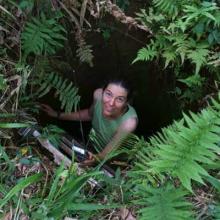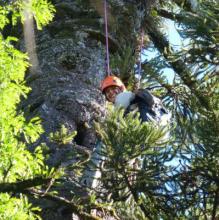Kristina Cockle
What are your main responsibilities or activities in your current position?
I supervise graduate students and conduct research on ecology and forest bird conservation.
How does your current work relate to your graduate degree?
I'm in a research position, so it is quite a natural progression after a PhD and post-doc. Several of the skills I learned and practiced in graduate school have been directly applicable to my current position, including ecological theories, study design, use of models in ecology, writing grant proposals and scientific papers, and collaborating with colleagues.
What do you like and what do you find challenging about your current position?
I think what I like best is the freedom. Freedom to be a life-long learner, to conduct research on the questions I am most interested in, to work with great colleagues all over the world, to spend lots of time in the field, and to run a really cool outreach program in a biodiversity hotspot. It is both fun and challenging to keep on top of advances in ecology and education, plan research projects, help my students conduct really novel research, learn about mentorship, and figure out how to answer our questions. The challenge I struggle with most is the same one that most academics face: finding time for everything I want/need to do.
Is your current career path as you originally intended?
No. I once told my master's supervisor that "I will never do a PhD!" (She just laughed kindly and said "well, you never know..."). I thought I'd like to work in an NGO or similar, because I wanted to "make a difference" in the world. I started a conservation project, but we needed a lot of field research to even figure out how to move forward. After a year I decided that it made sense to do a PhD in this context. I realized that in many ways, a career in research is a lot more flexible than an NGO job. I have lots of opportunities to work on practical conservation problems, and, importantly for me, I can still spend lots of time in the field.
What motivated you to pursue graduate work at UBC?
I was running a conservation project and we needed to figure out where to direct our efforts. I started a PhD in Forestry at UBC to address some of our questions.
What did you enjoy the most about your time as a graduate student at UBC?
I think what I enjoyed most were the relationships formed with friends and colleagues around the world through working on projects together.
What key things did you do, or what attitudes or approaches did you have, that contributed to your success?
I started with my own questions (about birds), found supervisors who were interested in similar questions, then got funding and went out to climb trees and follow birds around. So the project was basically driven by my questions and interests, which I think was key for keeping it fun over five years. While doing my PhD I was also able to do lots of side projects and they were all generally aligned with a career in research (e.g. writing other papers for fun with friends, running an outreach program). Because my research project was closely aligned with my supervisors' programs, but in a different system, we have continued to collaborate long past my PhD, which has been very rewarding personally and professionally. Finally, I made a big effort to take advantage of all the feedback I could get from my committee, co-authors, and reviewers, which I think has been key to my learning.
What is your best piece of advice for current graduate students preparing for their future careers?
Take advantage of UBC programs and other resources (books, websites, conference workshops) to develop skills in active listening, mentorship and building consensus.
Did you have any breaks in your education?
Yes, I had a two-year break between my masters and PhD. I had not planned to do a PhD. This break was critical for me because in this time I established a conservation project in Argentina, which led to the questions I posed in my PhD thesis. I continued this conservation project throughout my PhD, post-docs, and now as a research scientist.
How did you find out about/obtain your current position?
Most basic research in Argentina is done at CONICET, so I knew about the organization through friends and colleagues. I applied through one of the annual competitions. It involves submitting a CV and research proposal, which are evaluated by other scientists within CONICET.
How are jobs normally posted and filled in your organization or industry?
Opportunities for research scientists are posted on the website of CONICET and filled through competitions.

